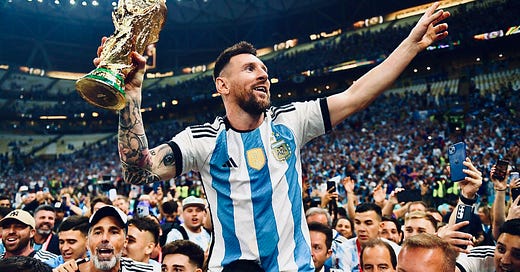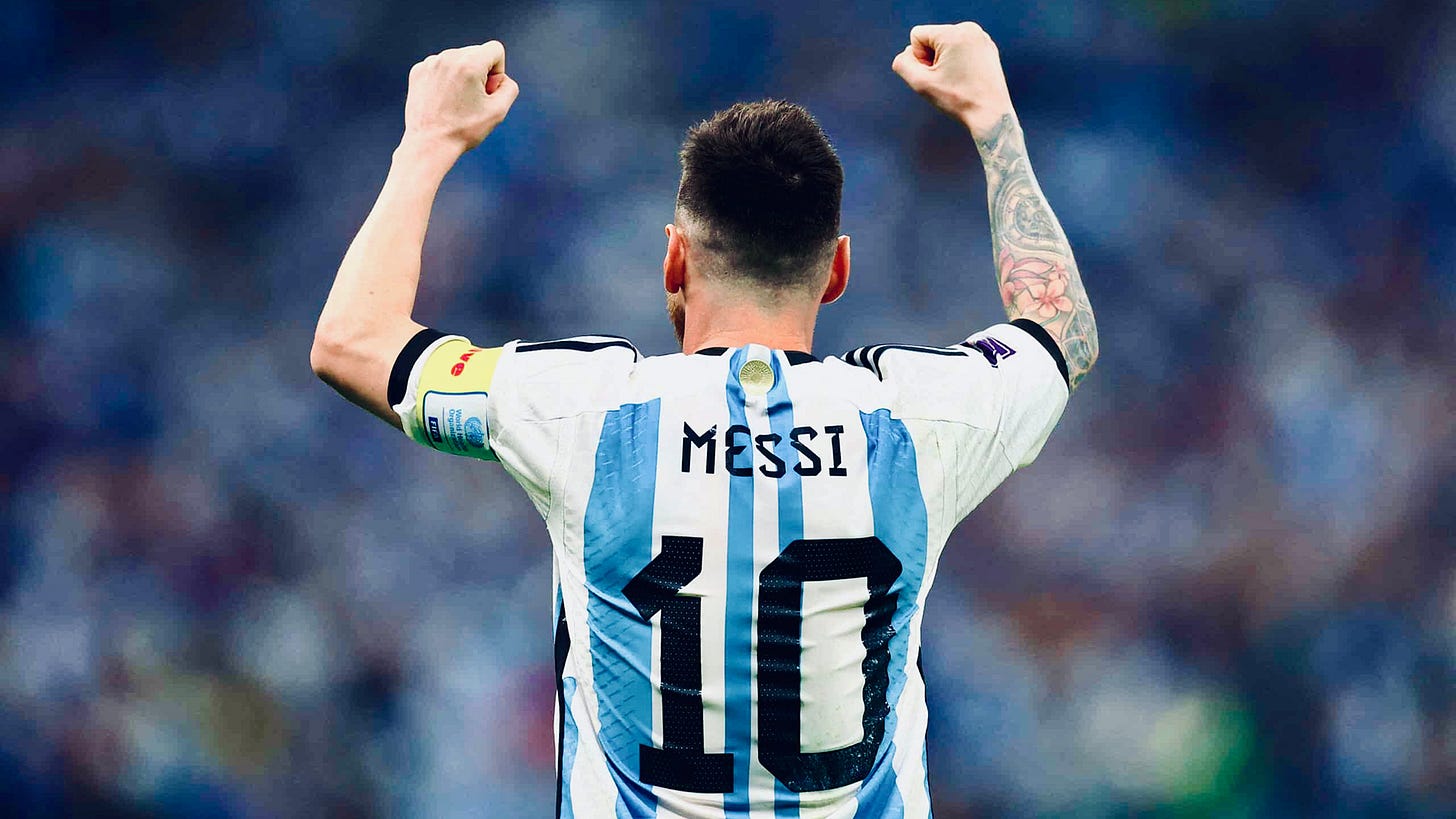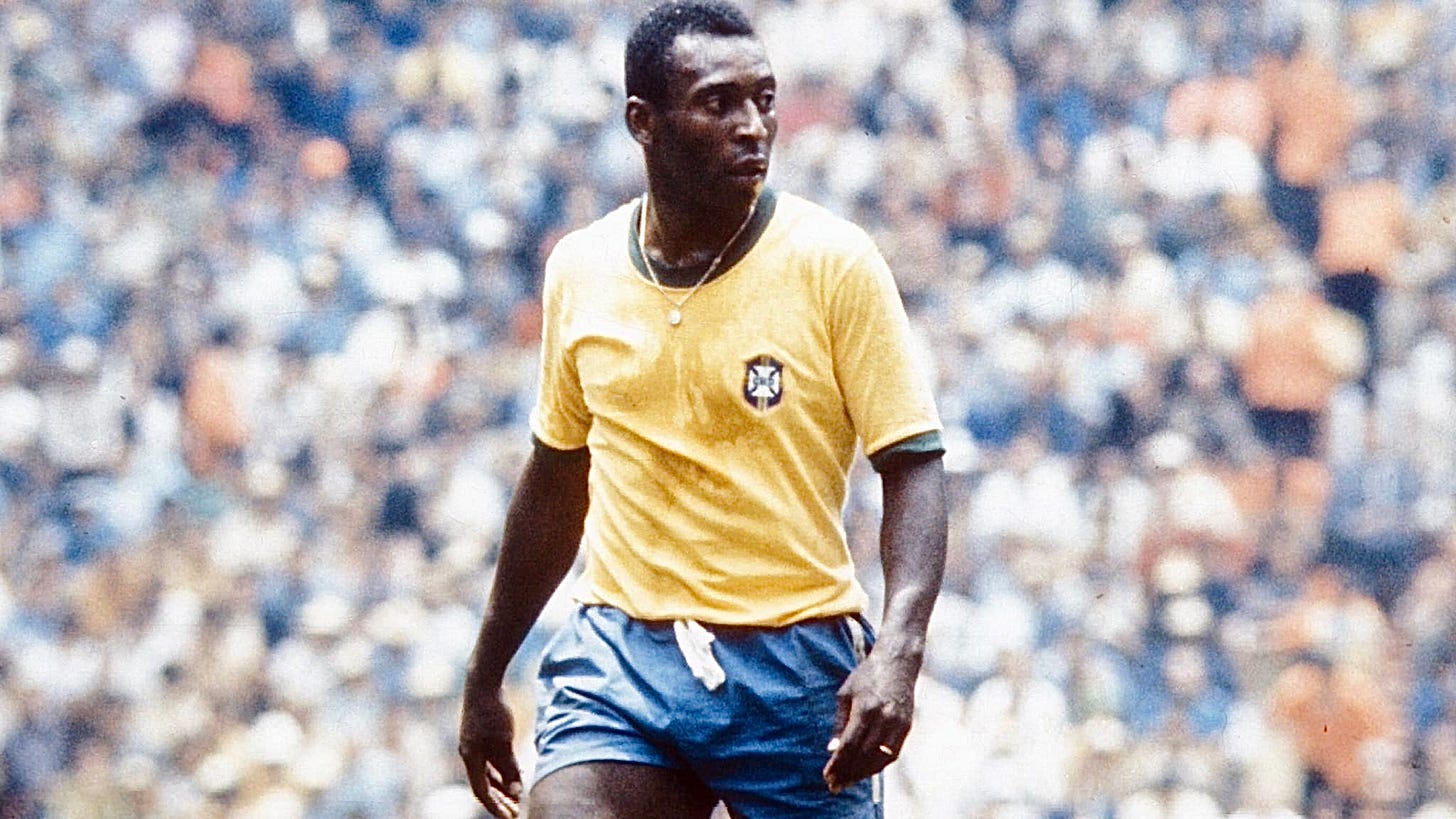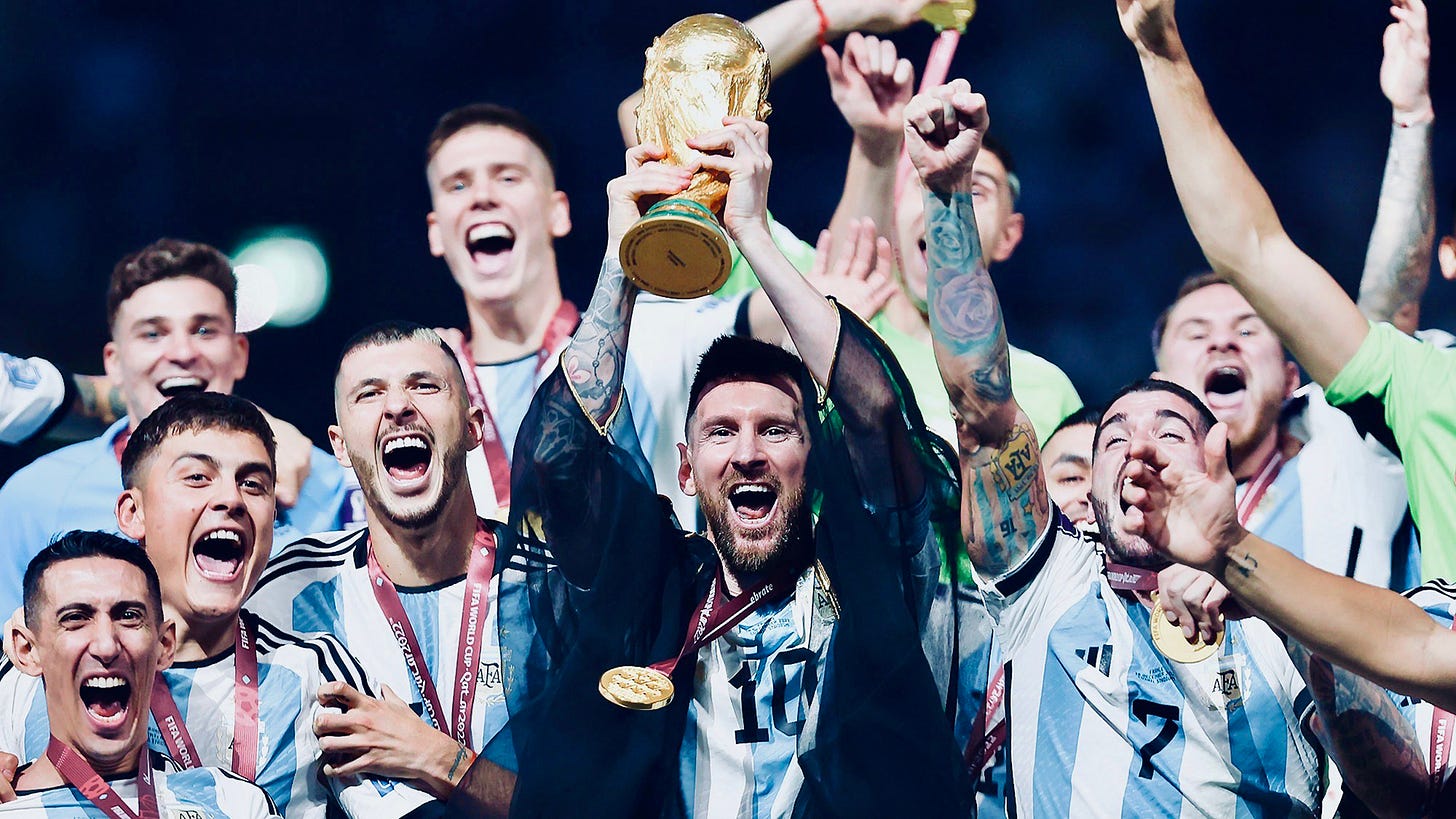Gonzalo Montiel’s World Cup-winning penalty went past France goalkeeper Hugo Lloris, and Argentina players scattered from the centre circle unsure what to do or where to collect in the delirium of securing football’s biggest prize.
“Greatest of all time” was trending on Twitter before Lionel Messi could touch the trophy. It’s dangerous to click trending topics these days, but I clicked it. Most of the tweets were congratulatory, but a handful were happy to dispute the claim.
For years I’d been told Messi starring as lead actor in a victorious, World Cup-winning squad would suffocate the argument. That an Argentina triumph would usher football fans into a period of soul-searching and personal development as an item of common ground would now exist: The greatest footballer of all time. What would there be to debate?
Alas, naïveté.
That which was meant to free has further bound.
This World Cup has permanently elevated the conversation from “Messi against his contemporaries” to “Messi against the pantheon.”
Over the course of these essays you will discover I was raised in the church. Many of my earliest memories are learning Bible stories and scripture verses in Sunday school. While no longer a regular attendee, those early years were quite foundational; so when trying to explain things, my mind quickly goes to the book.
I’ll keep it brief. Jesus had a group of 12 disciples. Of those 12, three were His favourites: Peter, James, and John. Whenever Jesus went on missions—like going to a mountain top or praying in a garden—Peter, James, and John were always the ones He kept close.
This is important only to simplify a nuance. Within those who have been selected, there are levels within that selection. All 12 were disciples, but not all 12 were created equal. Following His example, if Jesus discriminated between disciples, we should be able to discriminate between footballers.
While acknowledging the greatness housed within Johan Cruyff, Ronaldo, Zinedine Zidane, No. 7, Franz Beckenbauer, and Ronaldinho—among others who would claim a seat at the table—football has three chosen ones. Diego Maradona and Pelé are two, Messi has undoubtedly distinguished himself as the third and can be placed with those set apart, within those already set apart. For some the 35-year-old was already there, but I needed a World Cup winners’ medal from him to breach the duopoly.
Another time we can explore Messi and Maradona in more detail. Comparisons are there to be made (and always have been between the two Argentines), but Pelé is who I saw most used to arrest Messi’s momentum in the afterglow of his first World Cup.
Pelé is the foundation of modern football. How players shoot, dribble, move, and think can all be traced in some way to Brazil’s star from the 1950s, 1960s, and 1970s. It is largely how he maintains a place in our collective memory despite last appearing for Brazil in 1971—his updated goal tally notwithstanding.
That credit is the extent to which I put players from the mid-twentieth century in direct conversation with those playing today. Anything more is a fool’s errand. There is no feasible way to accurately gauge how football has changed over six decades with the human eye and be serious about the conclusions, yet that is how things are generally argued. Someone is placed inside a mental time machine, the date is set, and analysis is made based on those conditions as if time itself is static.
If Pelé played in 2022 he’d be in League Two.
If Messi played in 1958 he’d score seven goals every game.
Lord give me strength to fight this foolishness. Amen.
One of the fundamental principles of dialectics is “everything changes all the time.” In A Contribution to the Critique of Political Economy (1859), Karl Marx wrote:
It is not the consciousness of men that determines their existence, but their social existence that determines their consciousness.
If everything changes all the time, how people act and think is always changing. These changes are conditioned by (if you’re Marx) one’s relationship with capital in its most simplistic form. Changes in this relationship (history) can be documented and studied from art, to media, to politics, to science, to religion, to culture (which could include sport), and so on. Marx had no intention of discussing football; his life and the sport barely overlapped, but the logical undergirding provided is key.
There is no conclusive way to put Messi above Pelé. Likewise, there is no conclusive way to put Pelé above Messi. The best we can do is recognise the time in which they played, make determinations about them relative to their contemporaries, and judge how they navigated football and the footballing structures present in their respective eras.
The football Pelé played cannot be the football Messi plays. The football Messi plays would not exist without the football played by Pelé (and those in-between). Moreover, the football Messi plays will not be the football played in 2070, and the football played in 2070 will not be made without including solutions found by Pelé, Messi, and those in- between each.
The final piece is the difference between “greatest” and “best.”
“Greatest” and “best” are not the reversible jacket your mother bought you as a birthday gift. As I interpret them, the state or quality of being the greatest is relative to one’s era. The state or quality of being the best can either transcend era or be limited to specific timeframes provided those in conversation have an understanding.
If one made the argument Messi is the best footballer of all time, I would simply type: “Agreed.” Each generation gets the benefit of learning from and building upon the foundations laid by those who came before, plus any societal advancement in science, technology, and infrastructure that might improve or sustain the human body to points not previously possible.
[As an aside: If one argued this is the best era of football, so being the greatest now makes Messi the greatest ever, that would be interesting; but “everything changes all the time” does not mean change is in every instance linear.]
Messi has been the best since 2009. He didn't need a World Cup medal to prove it. That marker is determined by what you do with the ball at your feet, and the level of consistency your feet provide; what Messi has displayed over the last 15 years is undeniable. He is the best until Earth produces another phenomenon—be it tomorrow or 20 years from now.
The highest compliment I can offer any player is being the greatest of their era. Messi has earned that distinction. Among his peers the closest was No. 7, and this World Cup widened the gap. Which is why harmony should settle upon this subject—at least when discussing football since the 2006 World Cup—but amicability is something we’re not capable of manufacturing.
So where does this leave us?
The same place it always has. As a writer I like imagining people read my thoughts and are moved to change their minds, but that isn’t how this works.
The camps from which to choose have now been condensed to three.
[I say three, but some No. 7 supporters still have their weapons drawn. They’re like those Japanese soldiers who didn’t know World War II was over, so remained hidden in Pacific jungles defending outposts long since forgotten.]
Depending when you were born, where you were born, your political disposition, or simply how your brain processes images, you get to pick Pelé, Maradona, or Messi. There will be principled exceptions, I’m sure, but nothing can change the central dynamic. It is now a game of musical chairs with one seat and three players walking around in a circle.
The music will never stop. 🎯









